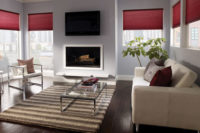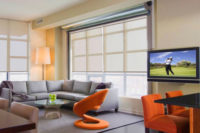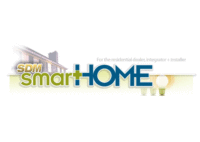The concept of security and convenience merging together has been discussed for many years, but in 2014 the concept is being realized on a grand scale. As a result, now is the perfect time for security dealers to transform their businesses by embracing interactive home control applications such as lighting and shade controls and proceeding to sell them with gusto.
While homeowners still want the peace of mind that security systems provide, they also want to interact with their homes while they are in them or connect with them remotely via their smartphones when they are away. In an effort to establish a major presence in this space, the nation’s largest telephone and cable companies are reinforcing this broader definition of security by running powerful advertising campaigns. The ads are educating the entire consumer base about the many ways people can interact with their homes for convenience and security’s sake. That includes lighting and shade controls.
The competitive pressure is on, but there is good news for dealers — selling lighting and shade controls is win-win-win proposition. Sales including home controls already are increasing RMR per customer approximately $40 to $60, says Avi Rosenthal, vice president of security and control for Carlsbad, Calif.-based Linear LLC, and a former security dealer. These sales also help dealers retain and renew relationships with existing customers and open doors to new ones.
In addition, the wireless technologies used to support home controls have matured to a point that they are decreasing in price. For example, the Z-Wave Alliance recently announced the certification of the 1000th product using its wireless control protocol. Cards equipped with Z-Wave, ZigBee and other wireless protocols are easy to install in existing security panels and they come standard with new panels. This enables dealers and their customers to select best of breed products, Rosenthal explains.
“Now security dealers can be true technology consultants or digital farmers because consumer awareness is so high and people really want these systems,” he adds.
Essentially, the only thing standing in the way of security dealers’ success in the emerging home controls space is their willingness to enter it. Lighting and shade controls are a great place to start because they have an instant and profound impact on customers’ daily lives and they are more interesting to talk about than a leak detector, Rosenthal says.
“Dealers are very comfortable selling reactive systems. They need to make the change to selling interactive, proactive automated systems,” said Delia Hansen, residential marketing manager for Crestron Electronics Inc., Rockleigh, N.J.
The rewards for selling lighting and shades are well worth the effort. While they are more difficult to sell than security systems or televisions, they have the highest post-occupancy satisfaction rating of any home system, she adds.
Security dealers that offer lighting and shades to every new customer will make at least 10 percent of the sales they simply propose. They also will keep sales they make that are offered as part of a 30-day challenge. It’s the rare customer that will ask a dealer to remove the lights or shades in a room they use frequently, Hansen adds.
“Every day you turn lights on and off and you find out how much time you used to spend doing that. Plus, it’s really great to have everything perfectly lit because you can see everything so much better,” Hansen says.
Dealers that do not have the necessary high-voltage license to do lighting installations themselves should not wait until they get their own licenses. The best strategy is to partner with someone who has a license and start selling and installing as soon as possible, says Greg Rhoades, director of marketing for Leviton Security & Automation, New Orleans.
“Lighting is on the minds of many consumers because there are campaigns underway to make them aware of rules ending the sale of 40- and 60-Watt light bulbs,” Rhoades explains. “When they come looking for new bulbs, consumers are going to be asking for something to help them control all the fancy new lights they just bought.”
In addition, millions of people watched Philips demonstrate the future of LED controls during the 2014 New Years Eve ball drop in New York’s Times Square. Smaller, affordable options such as LEDs are giving people a taste for all the things they can tie together and control in their homes, Rhoades adds.
“We want our dealers to be the home technology experts. We want homeowners to look at them and say, ‘Whatever goes on in my house I want to know that you have it under control,’” Rhoades says.
Some may need to partner for a high-voltage license, but security dealers already have the skills they need to succeed in the home control business including programming complex systems, placing systems properly in the home and installing them expertly, Rosenthal adds.
While dealers may be more comfortable selling only lighting controls, those who include shade controls will benefit even more. First, they are less likely to look at today’s market with “silo-vision.” Second, shade controls are important to their customers.
For example, it wasn’t very long ago when car dealers were still selling cars with manual, roll-up windows. Today, automatic windows are the rule, not the exception. Shades are following suit, explains Blake Deal, sales director, residential systems for Lutron Electronics, Allentown, Penn.
As with lighting controls, dealers that want to get into the shade controls business while the opportunity is peaking can partner with businesses that sell shades and not miss a beat. Security dealers that prefer to go it alone learn that partnering at the beginning is in their best interest, Deal says.
“Dealers that team-up with the experts on their first shade control jobs make more money than those who do not,” he notes.
In addition to being the bigger spend of the two types of controls, dealers also should be mindful that shade controls complete the lighting palette of their customers’ homes. Homeowners want the ability to control natural light using shades because they improve security and provide UV protection for the contents of their homes, Deal adds.
“A big part of the connected home is being connected to homeowners and to the right partners,” Deal says. “How far you pull the thread that connects the dots for your own business is up to you, but everything is connected.”
Willing To Pay
Consumers are definitely willing to pay for home controls such as lighting and shading, according to Bill Ablondi, director — smart home strategies for Strategy Analytics’ Digital Consumer Practice, Newton, Mass.
Both lighting and shade controls go hand-in-hand with security and energy management. The technologies are easy to understand and can be an integral part of much bigger potential sales, Ablondi says.
As large-scale advertising by large telephone and cable companies increases consumer awareness of home controls, dealers would do well to think of lighting and shade controls as part of the whole concept of interactive, rather than passive security, he advises.
“We are living in an era in which people are used to connecting with a lot of people, places, work places, bank accounts, travel agencies, airlines and things around their homes with their smartphones,” he adds.
While his research shows that the amount consumers are willing to pay is not as high as dealers might like to see it, the fact that they are willing to pay something proves there is demand. It also means that dealers need to pay close attention to pricing and packaging to ensure that their offerings are valuable to customers, Ablondi says.
Dealers are still selling “peace of mind,” but now that concept has all of the dimensions associated with consumers’ interactive, daily lifestyle activities.
“I think the whole idea of access controls, door locks, garage door openers, window covers and lighting blends together as total security,” Ablondi observes.
Lighting & Shades Sales Tips
- Offer lighting and shade controls with every sale
- Get on the phone and talk to customers about their routines
- Use whatever controls you sell in your own home
- Tell stories about how lighting and shade controls are working for you
- Get educated online, through manufacturers, or industry trade shows
- Partner, partner, partner
- Implement existing skills: programming, placement, installation







